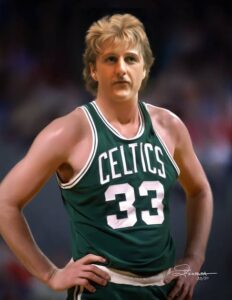The Debate on Larry Bird’s Legacy: Examining Why Some Believe He Isn’t a Basketball Legend
Larry Bird is often celebrated as one of the greatest basketball players of all time, revered for his skills, competitiveness, and success with the Boston Celtics. However, some critics argue against Bird’s legendary status, presenting various reasons why they believe he should not be considered a legend in basketball. This debate explores these arguments and their implications.

### Limited Athleticism
One of the primary criticisms of Larry Bird’s legendary status revolves around his perceived lack of athleticism compared to other basketball greats. Critics point out that Bird’s physical attributes were not on par with players like Michael Jordan or LeBron James, who possessed extraordinary speed, agility, and vertical leap. They argue that Bird’s relatively limited athleticism should disqualify him from being considered among the all-time greats who relied heavily on their physical prowess to dominate the game.
### Era of Competition
Another argument centers on the era in which Bird played. Critics claim that the level of competition in the NBA during Bird’s career was not as fierce as it is today. The league has evolved, becoming more global and competitive, with a higher overall talent pool. Bird’s success, they contend, came during a time when the game was less athletic and dynamic, and therefore, his achievements should be viewed in that context. They suggest that Bird’s era lacked the depth of talent seen in modern NBA, which diminishes his accomplishments.
### Injuries and Longevity
Bird’s career was marred by injuries, particularly to his back, which ultimately shortened his time on the court. Critics argue that his relatively short career span, compared to other legends who maintained peak performance for longer periods, diminishes his standing. They suggest that true legends of the game demonstrate longevity and the ability to perform at a high level over an extended period, something they believe Bird fell short of due to his physical ailments. This perspective emphasizes the importance of sustained excellence in assessing a player’s legacy.
### Statistical Comparisons
When comparing Bird’s statistics to other all-time greats, some critics point out that his numbers, while impressive, do not always measure up. They argue that players like Wilt Chamberlain, Kareem Abdul-Jabbar, and Michael Jordan posted more dominant statistical performances over their careers. Bird’s critics use this data to assert that he does not belong in the upper echelon of basketball legends. They highlight that while Bird was an outstanding player, his individual statistics are not as overwhelming as those of other top-tier players.
### Team Success vs. Individual Accomplishments
While Bird’s Boston Celtics enjoyed tremendous team success, winning three NBA championships during his tenure, some argue that his individual accolades do not stack up against those of other basketball legends. Critics point to the fact that Bird won three MVP awards, but compare this to the higher totals achieved by players like Michael Jordan and LeBron James. They argue that Bird’s contributions, while significant, were often bolstered by the presence of other Hall of Fame teammates such as Kevin McHale and Robert Parish. This viewpoint questions whether Bird’s success was a product of his environment rather than his individual greatness.
### Lack of Cultural Impact
Another angle of critique is Bird’s perceived lack of cultural impact compared to other basketball icons. Critics argue that players like Michael Jordan and Magic Johnson transcended the sport, becoming global ambassadors and cultural icons. They suggest that Bird, despite his on-court success, did not have the same level of influence off the court and did not contribute as significantly to the global growth of basketball. This perspective highlights the broader impact that legends have beyond their athletic achievements.
### Conclusion
While Larry Bird’s legacy is celebrated by many as one of the greatest to ever play the game, these arguments illustrate the perspective of those who challenge his status as a basketball legend. They cite his limited athleticism, the era of competition, his injury-shortened career, statistical comparisons, the nature of his team success, and his cultural impact as reasons why he may not be considered among the absolute greatest in the sport’s history.
However, it is essential to acknowledge that the debate about Bird’s legacy is subjective and often influenced by personal biases and perspectives. For many fans and analysts, Bird’s exceptional skills, fierce competitiveness, and significant contributions to the game make him a legend in every sense of the word.


